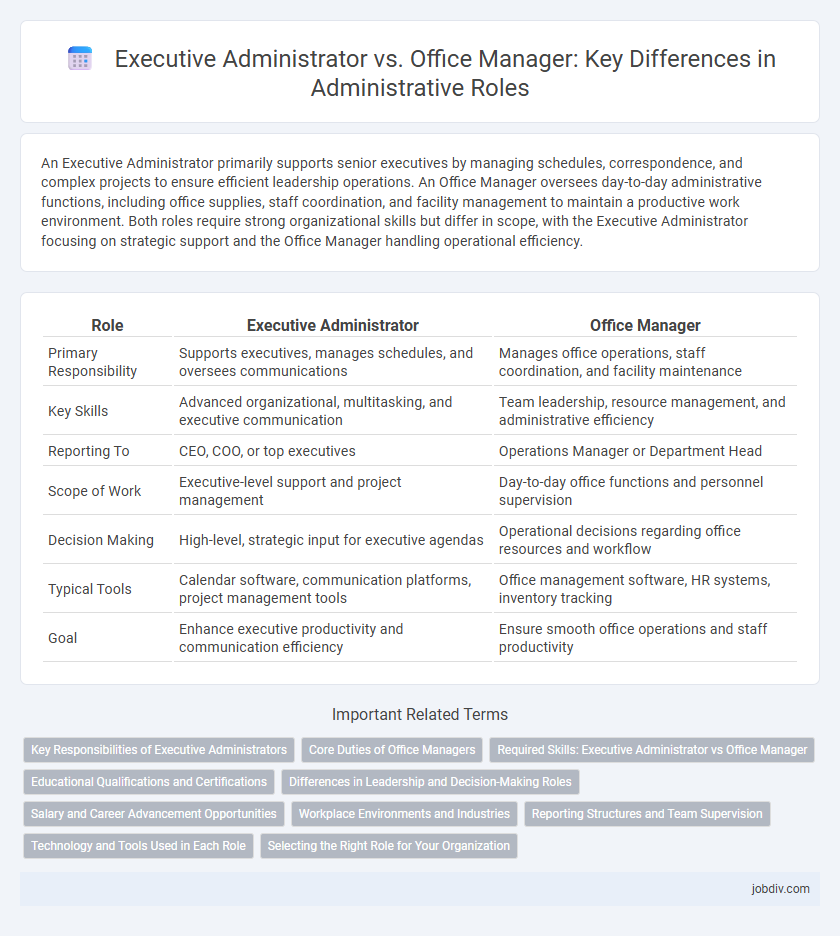An Executive Administrator primarily supports senior executives by managing schedules, correspondence, and complex projects to ensure efficient leadership operations. An Office Manager oversees day-to-day administrative functions, including office supplies, staff coordination, and facility management to maintain a productive work environment. Both roles require strong organizational skills but differ in scope, with the Executive Administrator focusing on strategic support and the Office Manager handling operational efficiency.
Table of Comparison
| Role | Executive Administrator | Office Manager |
|---|---|---|
| Primary Responsibility | Supports executives, manages schedules, and oversees communications | Manages office operations, staff coordination, and facility maintenance |
| Key Skills | Advanced organizational, multitasking, and executive communication | Team leadership, resource management, and administrative efficiency |
| Reporting To | CEO, COO, or top executives | Operations Manager or Department Head |
| Scope of Work | Executive-level support and project management | Day-to-day office functions and personnel supervision |
| Decision Making | High-level, strategic input for executive agendas | Operational decisions regarding office resources and workflow |
| Typical Tools | Calendar software, communication platforms, project management tools | Office management software, HR systems, inventory tracking |
| Goal | Enhance executive productivity and communication efficiency | Ensure smooth office operations and staff productivity |
Key Responsibilities of Executive Administrators
Executive Administrators oversee high-level administrative functions, including managing executive schedules, coordinating communication between executives and stakeholders, and preparing detailed reports and presentations for strategic decision-making. They ensure seamless office operations by supervising administrative staff, handling confidential information, and facilitating project management tasks aligned with organizational goals. Their role often involves liaising with senior leadership to implement company policies and streamline executive workflows.
Core Duties of Office Managers
Office Managers primarily oversee daily administrative operations, including managing office supplies, coordinating schedules, and supervising administrative staff to ensure organizational efficiency. They handle facility management, implement office policies, and serve as the main point of contact for internal and external communications. Unlike Executive Administrators who focus on supporting top executives, Office Managers maintain overall office functionality and operational workflow.
Required Skills: Executive Administrator vs Office Manager
Executive Administrators require advanced skills in strategic planning, communication, and project management to support high-level executives effectively. Office Managers need proficiency in organizational skills, team coordination, and daily operational oversight to ensure smooth office functionality. Both roles demand strong problem-solving abilities and expertise in administrative software, but Executive Administrators often handle more complex decision-making tasks.
Educational Qualifications and Certifications
Executive Administrators typically hold advanced degrees such as a bachelor's or master's in business administration, management, or a related field, often complemented by professional certifications like Certified Administrative Professional (CAP). Office Managers generally require a minimum of a high school diploma or associate degree, with preferred certifications including Microsoft Office Specialist (MOS) or Project Management Professional (PMP) depending on the complexity of office operations. Both roles benefit from continuous education and industry-specific training to enhance organizational efficiency and leadership capabilities.
Differences in Leadership and Decision-Making Roles
Executive Administrators typically hold higher leadership authority, overseeing strategic decisions and aligning administrative tasks with organizational goals. Office Managers focus on day-to-day operations, managing staff schedules, office supplies, and workflow efficiency. Decision-making for Executive Administrators involves long-term planning and policy development, while Office Managers handle immediate problem-solving and operational execution.
Salary and Career Advancement Opportunities
Executive Administrators typically earn higher salaries than Office Managers due to their advanced responsibilities in strategic planning and executive support, with median annual earnings often exceeding $70,000. Office Managers generally receive salaries ranging from $45,000 to $60,000 depending on company size and industry. Career advancement opportunities for Executive Administrators include senior executive roles and specialized administrative positions, whereas Office Managers may progress into operations or departmental management.
Workplace Environments and Industries
Executive Administrators typically operate within corporate, legal, or healthcare environments where they manage high-level executive support and complex scheduling. Office Managers are commonly found in small to mid-sized businesses across retail, education, or nonprofit sectors, overseeing daily office operations and staff coordination. Both roles require adaptability, but Executive Administrators often navigate more hierarchical workplaces, whereas Office Managers work in more dynamic, multifaceted office environments.
Reporting Structures and Team Supervision
Executive Administrators typically report directly to C-level executives, ensuring seamless communication between senior management and operational teams, while Office Managers often report to department heads or business owners. Executive Administrators oversee strategic support functions and may supervise other administrative staff, focusing on high-level coordination and executive priorities. Office Managers manage daily office operations and supervise administrative personnel, emphasizing workflow efficiency and team productivity within the office environment.
Technology and Tools Used in Each Role
Executive Administrators typically leverage advanced scheduling software, customer relationship management (CRM) systems, and data analytics tools to optimize executive calendars and streamline communication. Office Managers rely heavily on office management platforms, inventory tracking software, and integrated communication tools to coordinate office operations and maintain workflow efficiency. Both roles increasingly utilize cloud-based collaboration suites and project management applications to enhance productivity and support remote work environments.
Selecting the Right Role for Your Organization
Selecting the right role between an Executive Administrator and an Office Manager depends on organizational needs and structure. Executive Administrators typically handle high-level support for senior executives, managing complex schedules, communications, and confidential projects. Office Managers oversee daily office operations, staff coordination, and resource management to ensure organizational efficiency and workplace functionality.
Executive Administrator vs Office Manager Infographic

 jobdiv.com
jobdiv.com